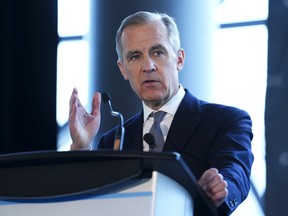Between 1997 and 2024, Canada’s use of fossil fuels as a primary energy source grew by 17 per cent despite a commitment to transition to a ‘net-zero’ system.
Article content
Following last month’s European Union-Canada 2025 Summit, Prime Minister Carney and his EU counterparts issued a joint statement reaffirming their shared commitments, which include reaching “net-zero” by 2050 and transitioning away from fossil fuels.
Advertisement 2
Article content
This confirms the Carney government intends to stay the course set by the Trudeau government. However, despite these commitments and the trillions invested toward this goal, the timeline to phase out fossil fuels and achieve a zero-carbon economy by 2050 remains disconnected from reality.
Article content
Recommended Videos
Article content
Building a “net-zero” economy by 2050 requires phasing out fossil fuels — such as oil, natural gas, and coal — as primary energy sources, or offsetting their greenhouse gas emissions with other activities such as tree planting.
Governments and firms worldwide have devoted a massive amount of resources to achieve this goal. According to the International Energy Agency, between 2015 and 2025 alone, public and private investment in “clean energy” totalled approximately US$16.7 trillion (inflation-adjusted). That’s equivalent to China’s total economic output in 2022.
Article content
Advertisement 3
Article content
And yet, according to new data released by the Energy Institute, from 1997 (when the Kyoto Protocol set binding international decarbonization targets) to 2024, global use of oil, natural gas and coal increased by 58 per cent. Specifically, oil consumption grew by 33 per cent, natural gas by 87 per cent and coal by 73 per cent.
In 2024, fossil fuels still provided 80.6 per cent of global energy consumption — a slight decline from 85.7 per cent in 1997.
Canada has followed a similar pattern despite the billions spent by Ottawa and various provinces. Between 1997 and 2024, our country’s use of fossil fuels as a primary energy source actually grew by 17 per cent. And the share of fossil fuels in Canada’s total energy consumption rose from 63.1 per cent in 1997 to 66.3 per cent in 2024.
Advertisement 4
Article content
Simply put, despite a cascade of regulations, taxes and multibillion-dollar subsidies, the country is becoming more — not less — reliant on fossil fuels.
So, why hasn’t this costly push to transition away from fossil fuels played out the way Ottawa and the provinces intended?
Energy transitions take centuries
Because major energy transitions are inherently slow and take centuries, not a couple of decades.
As noted by scholar Vaclav Smil, the first energy transition — from biomass fuels such as wood and charcoal toward fossil-based energy — unfolded over more than two centuries. And that transition is still underway.
As of 2020, close to three billion people in developing countries still relied on charcoal, straw and dried dung for cooking and heating. These energy sources still accounted for roughly seven per cent of global energy consumption at the beginning of this decade.
Advertisement 5
Article content
Biomass (wood, charcoal, etc.) powered human civilization for millennia, and only around 1900 did coal became a predominant global energy source.
Moreover, it wasn’t until the 1950s that oil accounted for one-quarter of global fossil fuel consumption, reaching that milestone roughly 150 years after it was first introduced into the energy market.
And it wasn’t until the end of the 20th century, after about 130 years of development, that natural gas reached 25 per cent of all fossil fuels consumed worldwide.
World leaders, including Prime Minister Carney, should acknowledge reality and be transparent about the commitments they make on behalf of their citizens.
Despite decades of international pledges, costly policies and trillions spent, fossil fuel use keeps growing, making net-zero by 2050 a wholly unrealistic goal.
Julio Mejia and Elmira Aliakbari are analysts at the Fraser Institute.
Article content



